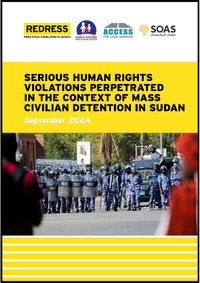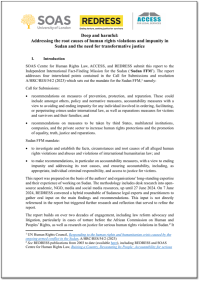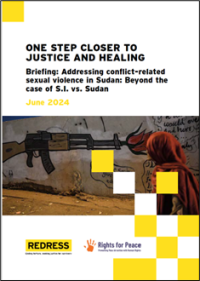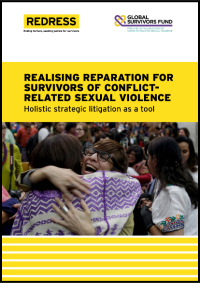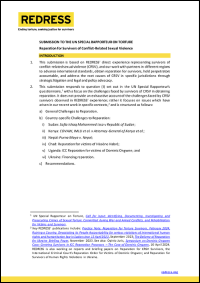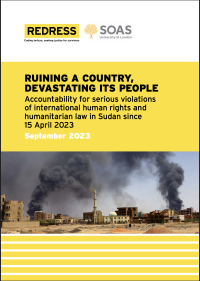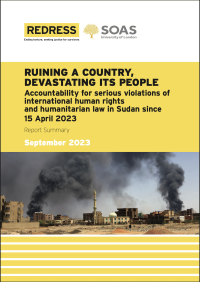Publications
REDRESS’ publications are also available in hard copy format. Please contact us for further information on [email protected].
The armed conflict in Sudan between the Sudanese Armed Forces and the Rapid Support Forces has caused unprecedented devastation. Rather than mitigating the magnitude of civilian harm caused by their fighting, the warring parties have each exploited the ongoing state of conflict to target civilians. This report is an abridged version of a submission made to the Independent International Fact-Finding Mission for the Sudan in July 2024 and addresses one of the most prominent features of the targeting: the ongoing arbitrary arrest, arbitrary detention, and torture and cruel, inhuman or degrading treatment or punishment by both sides of thousands of individuals, many of whom are civilians as part of a shadow war against civil society, human rights defenders, activists, and marginalised communities.
This report was submitted to the Independent International Fact-Finding Mission for Sudan on 3 July 2024. It was prepared by the SOAS Centre for Human Rights Law, ACCESS, and REDRESS. The submission builds on over two decades of engagement, including law reform advocacy and litigation, particularly in cases of torture before the African Commission on Human and Peoples’ Rights, as well as research on justice for serious human rights violations in Sudan. It identifies the root causes of human rights violations and impunity in Sudan, which encompass political, legal, social, economic, and cultural factors that have engendered violence and a lack of accountability.
Survivors of CRSV in Sudan struggle to access justice and obtain reparation. Perpetrators are rarely held accountable due to near total impunity of State-sanctioned violence embedded in Sudan’s power structures and legal framework. This briefing, written in partnership with Rights for Peace, provides an overview and recommendation on addressing CRSV in Sudan beyond the case of S.I., a student involved in pro-democracy rallies in Khartoum in 2011.
Conflict-related sexual violence (CRSV) is pervasive in all armed conflicts, regardless of their location or nature. This report describes the main challenges that survivors and practitioners face to realising the implementation of reparation, and identifies and shares good practice with practitioners in the field to address those challenges, with the ultimate goal of facilitating the delivery of reparation to survivors. This report is part of a REDRESS project that explores holistic strategic litigation as a tool to overcome the obstacles for the implementation of decisions awarding reparation for CRSV survivors.
Submission to the UN Special Rapporteur of Conflict-Related Sexual Violence on the challenges faced by survivors of conflict-related sexual violence (CRSV), in obtaining reparation. It is based on REDRESS’ direct experience representing survivors of CRSV, and our work with partners in different regions to advance international standards, obtain reparation for survivors, hold perpetrators accountable, and address the root causes of CRSV in specific jurisdictions through strategic litigation and legal and policy advocacy.
The report sets out the context of the armed conflict in Sudan, the overarching legal framework that applies during the armed conflict, prima facie evidence of legal violations committed by the Sudanese Armed Forces and the Rapid Support Forces and accountability avenues or measures for these alleged violations and some of the obstacles likely to be encountered. We thank the German Federal Foreign Office for making the Arabic translation of this report possible.
This report summary highlights the key findings and recommendations of our report "Ruining A Country, Devastating Its People: Accountability for serious violations of international human rights and humanitarian law in Sudan since 15 April 2023". The report sets out the context of the armed conflict, the overarching legal framework that applies during the armed conflict, prima facie evidence of legal violations committed by the Sudanese Armed Forces and the Rapid Support Forces and accountability avenues or measures for these alleged violations and some of the obstacles likely to be encountered. We thank the German Federal Foreign Office for making the Arabic translation of this summary report possible.
This submission addresses the three questions posed by the CED and WGEID regarding short-term disappearances (SED) from the perspective of the prohibition on torture. Using examples from SED cases in which REDRESS has been involved, this submission discusses the concept of SED and their manifestations in Sudan and Egypt, evaluates the legal and practical circumstances that lead to SED, and enumerates safeguards against SED including recommendations for States and the CED and WGEID.
